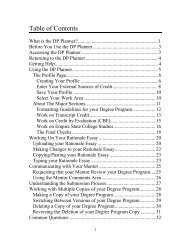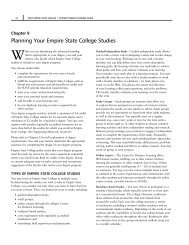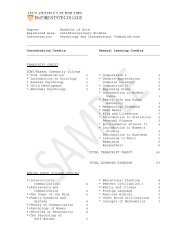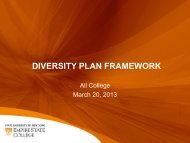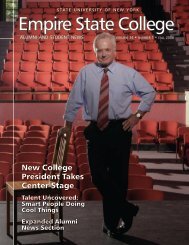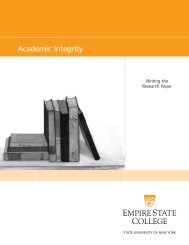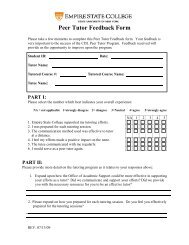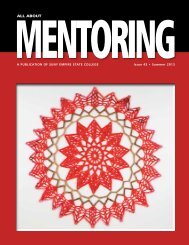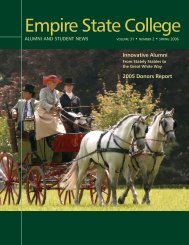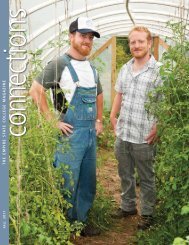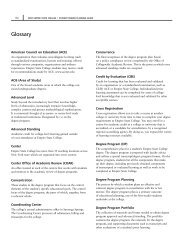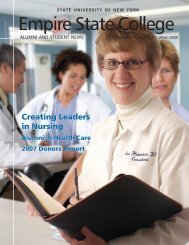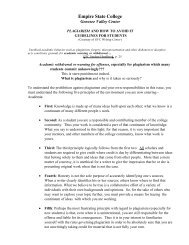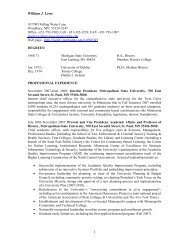Academic Plan 2011-2015 (PDF 524kB) - SUNY Empire State College
Academic Plan 2011-2015 (PDF 524kB) - SUNY Empire State College
Academic Plan 2011-2015 (PDF 524kB) - SUNY Empire State College
Create successful ePaper yourself
Turn your PDF publications into a flip-book with our unique Google optimized e-Paper software.
<strong>SUNY</strong> <strong>Empire</strong> <strong>State</strong> <strong>College</strong>: <strong>Academic</strong> <strong>Plan</strong> <strong>2011</strong> - <strong>2015</strong> 37(CML) is the college office responsible for faculty orientation and development in terms of the practiceof mentoring, and the college professor for adult learning and mentoring also works to support andpromote faculty achievement in the area of adult learning.Objective C2.1: Promote scholarly activity as an integral part of mastery of subjectmatter and teaching effectivenessScholarly engagement is beneficial to faculty, students, the institution and to society. As faculty engagein scholarly pursuits, they bring their new learning to their interactions with students. At the sametime, as new knowledge is created, the broader community benefits. Finally, scholarly activity sustainsfaculty in their own lives.We recognize the importance of the link between scholarly activity and teaching/mentoring. Weneed to promote scholarly activity as an integral part of mastery of subject matter and teachingeffectiveness. Faculty development through scholarship contributes to the ways in which mentors fulfilltheir roles. We need systematic approaches to promote and publicize faculty innovation in teachingand mentoring, viewed as a dimension of scholarship. In addition, it is important to understand thelink between faculty development activities (conferences, workshops, presentations, publications andtraining) and how knowledge gained from these activities is used in mentoring/teaching. The OpenUniversity model offers an opportunity to combine the mentor model, statewide presence and theability to go national and international, using multiple technologies.In addition to enhancing faculty work with students, scholarship is valued for its contribution to thegrowth of societal knowledge. As faculty develop increasing expertise in their own subject matter, theymust share that knowledge with others in their field in order for the broader community to benefit.The Center for Mentoring and Learning and the Office of the CPALM have identified a gap in support offaculty’s disciplinary/interdisciplinary scholarship and recommend explicit consideration of where andhow the institutional support for faculty’s scholarship in their fields of study should occur.Objective C2.2: Encourage and support collaborationWhile collaboration in mentoring and learning are supported through collegewide residencies andother endeavors, these connections should be further enhanced. The more faculty work with others,the less isolated they are in their discipline. In addition, part-time or adjunct faculty should besupported in terms of collaborative scholarly activity.Objective C2.3: Identify and optimize the resources for faculty developmentResources for faculty development at the college and beyond the college must be sufficient forfaculty success in terms of teaching, mentoring and scholarship. This includes sufficient support fromthe grants office, faculty development funding, internal seed or starter grants and reassignments/sabbaticals. In addition, funding opportunities need to be transparent, well advertised and equallydistributed across the college.Faculty development funds need to be sufficient to support both domestic and international travel forfaculty to engage in innovative approaches to teaching and mentoring, and related scholarship.



